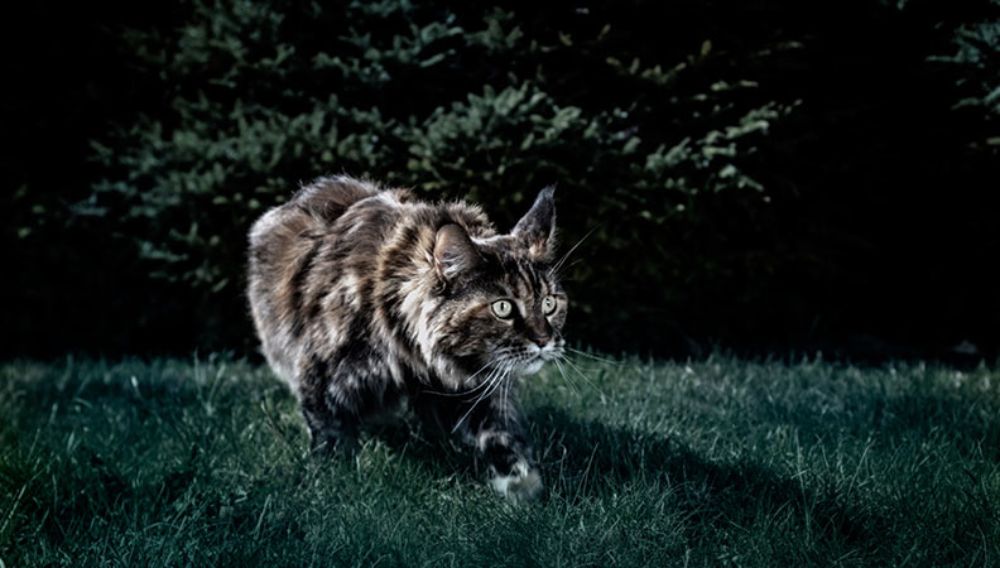
We've compiled some information about your cat's vision to help you understand how well your cat can see. It may also explain some of their behaviours at various times of the day.
How Do Cats See?
Your cat's eyes are shaped like a globe. They have an outer "shell" that creates the globe-shape of the eyes, and they have a lens and fluid on the inside. The lens focuses the light going into the eyes and directs it through the back of the eye and on to the retina (a thin layer of rod cells and cone cells).
Rod cells help your cat see in dark/dull light and are really good at detecting moving objects. That's why cats are excellent hunters! Cats have lots of rod cells in their retina, so they can see much better than us at night time.
What Colours Can Cats See?
This is where those cone cells come in. Cone cells work in bright light and also let your cat see colours. Cats' eyes have two types of cone cells, blue and yellow/green, which means they only see black, white, grey, and other colours in the blue and yellow spectrum. This is called dichromatic vision, which means two-colour vision.
So... Can Cats Really See in the Dark?
No! Like us, cats can't see in total darkness. They don't have 'night vision' but can see around 6-8 times better than we can in extremely low light conditions. Because your cat has many rod cells in their retina that are sensitive to low light, they can see well in low lit or dim conditions.
Cats are animals with vertically slit pupils rather than circular pupils, like ours. This allows the pupils to get much larger in the dark, which lets much more light into their eyes, meaning they can see better in the dark.
Just with a dogs' low-light vision, cats have a tapetum lucidum in their retina. This part of the eye is a reflective layer of tissue that increases their ability to see in low light. You've probably seen your cat's eyes shine in the dark when light shines on them. The tapetum lucidum reflects the light, making the eyes look bright and shiny.
Because cats can see very well at dawn and dusk, this is when they're most active. So, you'll likely see your cat head off hunting early in the morning and just before dark.
Cats also have other highly developed senses, like hearing and sense of smell, which help them navigate their environment. When combined with their eyesight, these keen senses allow them to thrive in all light levels.
What Do Cats See?
Cat's eyes are positioned wider than ours, giving them a wider field of vision, known as peripheral vision. Cats can see 200 degrees, whereas we see 180 degrees.
But, because of their wider set eyes, cats aren't as good at judging depth perception as we are. They also cannot focus on things closer than 25 cm from their eyes. This is where their sense of smell comes into play; they'll rely on this if they can't see something.
The ability to see things in detail is called visual acuity. We see things in lots of detail; in fact, we see things in ten times more detail than cats do! Cats also commonly experience refractive error, which makes them either long- or short-sighted. This is rarely an issue, though, as cats rely on hearing and smell to compensate for any vision impairments.
Although cats can only see yellows, greens, greys, black and white, they make up for it with great vision in poor light conditions and have better peripheral vision than we do. Cats also have amazing hearing and sense of smell, which helps when their vision lets them down!
Cats can develop issues with their eyesight, just like we can. Any sudden changes in your cat's behaviour, like being unable to jump or climb as well as they could or becoming disorientated, could be signs of a problem. Contact your vet who can examine their eyes to find out what's going on. If your cat has a problem, many eye treatments are available to help them.
Eyes are precious things, so don't delay calling your vet if you think there's a problem with your cat's eyes.
Everypaw Cat Insurance
Everypaw's Cat Insurance comes with 24/7 unlimited access to vets and vet nurses that can help with your pet's health, care, nutrition and behaviour. So you can rest assured your kitty will be well looked after.
Content provided from Vetstream's Vetlexicon Felis – www.vetlexicon.com/felis
Vetlexicon is the world’s largest peer-reviewed online clinical reference source. All our content is written and peer-reviewed by over 1,000 of the world’s leading veterinarians, ensuring relevance, accuracy and quality.
- Vetstream Ltd & McKeever F (online) Eyesight – what colors can cats see? In: Vetlexicon Felis. Vetstream Ltd, UK. Website: https://www.vetlexicon.com/felis/client-information/client-factsheets/eyesight-what-colors-can-cats-see/.